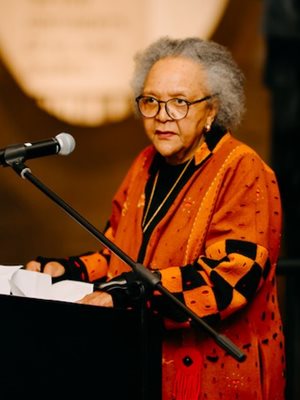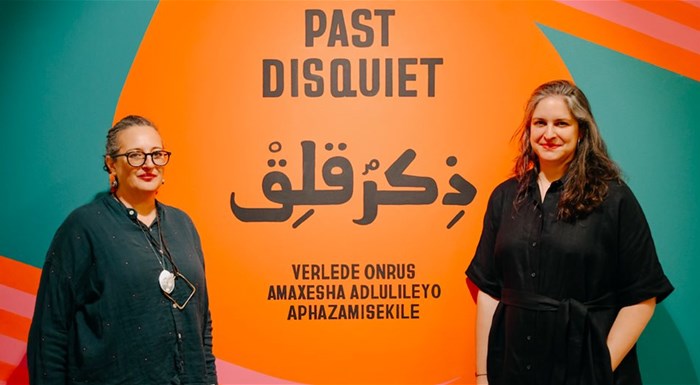
Zeitz Museum of Contemporary Art Africa (Zeitz MOCAA) has recently launched two new exhibitions titled Past Disquiet and Seismography of Struggle: Towards a Global History of Critical and Cultural Journals as part of their new season of exhibitions. Also present, Ambassador Barbara Masekela, South African poet, educator, and activist delivered the exhibition opening remarks calling on African youth to be more exposed and engage with historical narratives delivered through this archival exhibition and to take ownership by including their voices and perspectives in solidarity of movements of today.
Justice Albie Sachs gave a moving address at the book launch of Zeitz MOCAA’s latest publication, Radical Solidarity: A Reader where he shared anecdotes on radical solidarity reflecting on his own journey of active resistance against apartheid and how instrumental the collaboration with the arts was in raising awareness and fostering solidarity. The exhibitions will be available for public viewing at the museum over the next 10 months.
Past Disquiet is a documentary and archival exhibition based on research conducted by Lebanese curator-writer duo, and long-time collaborators, Kristine Khouri and Rasha Salti. For over a decade, they explored four seed collections of art that were intended to be 'museums in solidarity' or 'museums in exile', that incarnated the engagement of artists with a particular political cause. It is an exhibition of stories told with documents, photographs, pamphlets, press clippings, posters, interviews, and videos.
The research began as the two curators explored how the International Art Exhibition for Palestine, which took place in Beirut (Lebanon) in 1978, was meant to become the nucleus for a museum in solidarity with the Palestinian people’s struggle. Despite the size and scope of the exhibition, yet unprecedented for the region, it seems to have been totally forgotten. The story of that museum was closely connected to other similar collections and initiatives, namely, the International Museum of The Resistance ‘Salvador Allende’, the Artists Contre/Against Apartheid, and Art for the People of Nicaragua.
Central to our context, the curators expanded their research into Art Against Apartheid, conceived in 1978 by French artist Ernest Pignon-Ernest and the late Spanish painter Antonio Saura. This was a travelling exhibition of works by internationally recognised artists produced to raise awareness of the unjust regime of the National Party. In 1996, the collection made a homecoming, with the artworks exhibited in Parliament in Cape Town, taking the place of colonial portraits and landscapes to symbolise a new dawning of democracy in the nation, and now housed in the University of the Western Cape Robben Island Mayibuye Archives.

Past Disquiet is presented in parallel with the multi-media installation and database, Seismography of Struggle: Towards a Global History of Critical and Cultural Journals, an itinerant exhibition compiled and curated by French-Algerian art historian Zahia Rahmani. The exhibition is presented as a sound and image installation with multi-channel projections displaying journal covers, inside pages, and images of protagonists, accompanied by a manifesto of quotes from revolutionary editors and a soundscape by French composer Jean-Jacques Palix.
Furthermore, a browsable database of journals is available at https://sismo.inha.fr/. This approach attests to the incredible and inspiring volume of printed material produced as part of cultural and political struggles worldwide and highlights the diverse aesthetic strategies of revolutionary publishers.
Executive director and chief curator at Zeitz MOCCA, Koyo Kouoh, impresses that: “Seismography of Struggle brings to life the power of publishing and its revolutionary impact in social movements. Zahia’s dedication in researching and bringing together a publicly accessible database with its particular geographical and cultural focus is legendary, and at its core fundamentally political. Whilst leaning into the aesthetics of the archival object’s seductiveness, the meditative nature of the installation also allows for new connections to be made between these historic documents.”

Together, these two exhibitions speak to rich and radical histories of art and culture as integral to political struggles for democracy, equality, and sovereignty. These themes and values were explored in the one-day Symposium: The Poetics and Politics of Archival Practice with keynote lectures from the curators of Seismography of Struggle and Past Disquiet alongside distinguished guests from the field of art, activism, and academia.
The museum launched Radical Solidarity: A Reader which captures the profound ideas and projects of radical thinkers, artists, and activists committed to fostering the arts from Africa and its diaspora. The publication emerges from the proceedings of the Radical Solidarity Summit, a week-long online gathering hosted by Zeitz MOCAA in September 2020, during the Covid-19 pandemic, with the intention to not only address the urgent issues of the moment, but to explore the alternative futures, and possibilities that can be forged in the cultural field through acts of radical solidarity.
Edited by Tandazani Dhlakama, Alexandra Dodd, Tammy Langtry, and Storm Janse van Rensburg, the publication retains the conversational, intimate nature of the online gathering, whilst honouring the urgency and complexity of its subject matter. Contributors include blaxTARLINES KUMASI, Diana Campbell Betancourt, Nadia Davids, Tandazani Dhlakama, Abdul Dube, Frieda Ekotto, Sakhisiswe Gcina, Haroon Gunn-Salie, Storm Janse van Rensburg, Koyo Kouoh, Awa Konaté, Tammy Langtry, Mpho Matsipa, Achille Mbembe, Lemohang Jeremiah Mosese, Nontsikelelo Mutiti, Bonaventure Soh Bejeng Ndikung, Rémy Ngamije, Tuan Andrew Nguyen, Emeka Okereke, Bukola Oyebode, Marie Helene Pereira, Edgar Pieterse, Zahia Rahmani, ruangrupa, Albie Sachs, Rasha Salti, Phokeng Setai, Tau Tavengwa, and Françoise Vergès.
Commenting on the summit and subsequent reader, Koyo Kouoh said: “Many associate the term ‘radical’ with extreme reforms that shift the fundamental nature of things, while the word ‘solidarity’ brings to mind fellowship, unity and shared convictions among people. However, radicality does not always need to be loud and extreme. The silent, sotto and steady defiance of any given state of affairs can be just as radical as the loudest protest.”
Designed by Yvon Langué and Soukaina Aboulaoula of the design duo Untitled, this Reader gives collective voice to the historical and philosophical root system of Zeitz MOCAA as contemporary pan- and diasporic African art institution at the leading edge of global contemporary art practice and discourse.
Zeitz MOCAA's curatorial and educational programming is generously supported by Gucci and the Mellon Foundation. Seismography of Struggle is furthermore supported by the French Institute of South Africa (IFAS).